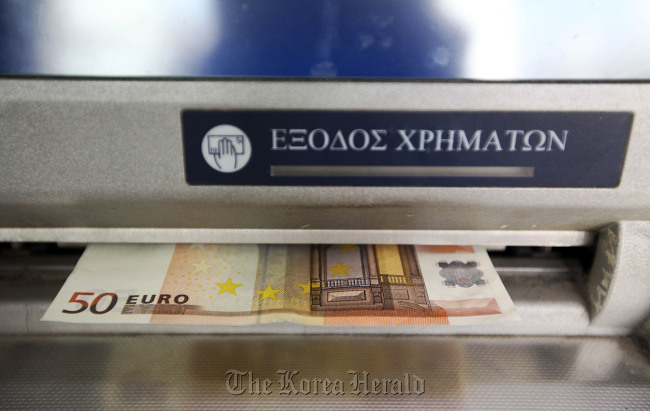ATHENS (AFP) ― Greece should have enough cash to pay pensions at least for July, the labor minister said on Wednesday after a report that the state only had enough money to pay salaries and pensions until July 20.
“Pension payments for July should not be a problem,” Antonis Roupakiotis told a press conference ahead of critical elections on Sunday, adding he could not comment on any payment after that as it was beyond his government’s mandate.
The minister, who is a member of a cabinet appointed on May 6, also warned that state-subsidized pension funds were in “a bad financial situation.”
His comments came after the Kathimerini daily published a report that said Greece only had about 2.0 billion euros ($2.5 billion) left in its coffers.
It did not cite sources, but other Greek outlets said the figures came from a briefing on Tuesday by the finance minister to the radical leftist Syriza party, which is seen as a possible victor of the June 17 vote.
“Pension payments for July should not be a problem,” Antonis Roupakiotis told a press conference ahead of critical elections on Sunday, adding he could not comment on any payment after that as it was beyond his government’s mandate.
The minister, who is a member of a cabinet appointed on May 6, also warned that state-subsidized pension funds were in “a bad financial situation.”
His comments came after the Kathimerini daily published a report that said Greece only had about 2.0 billion euros ($2.5 billion) left in its coffers.
It did not cite sources, but other Greek outlets said the figures came from a briefing on Tuesday by the finance minister to the radical leftist Syriza party, which is seen as a possible victor of the June 17 vote.

The finance ministry declined to comment on the reports.
On Tuesday, the ministry said state revenue was 666 million euros ($836 million) short of target for the first five months of the year.
The German weekly Die Zeit meanwhile cited government and financial sources saying Greece will probably need another EU bailout of tens of billions of euros (dollars) after the election in order to avoid “a state insolvency.”
“Even if Greece sticks to its reform path, the country will need fresh money this summer,” the paper said, citing a sum “in double figures” of billions.
A precondition for such a third bailout package would be that elections result in a government “that commits itself to further reforms,” Die Zeit said.
Greece has been forced to seek international help twice, first for 110 billion euros in May 2010 and then for 130 billion euros earlier this year plus a 107-billion-euro private debt write-off.
The country holds an election on Sunday that is being watched nervously by politicians and markets around the world, amid fears that the leftist Syriza party, which wants to tear up the bailout deals, will triumph in the vote.
If the next Greek government ― the formation of which in itself could be a tall order if the results are similar to a first election on May 6 ― reneges on its commitments, European leaders have warned that the flow of funds will cease.
This could precipitate the exit of Greece from the eurozone, experts warn.
German Chancellor Angela Merkel has stressed several times that she wants Greece to stay in the eurozone but that Athens must stick to its commitments.
Syriza’s 37-year-old leader Alexis Tsipras has alarmed European leaders by threatening to tear up the EU-IMF multi-billion loan agreement that has kept Greece afloat at the cost of painful austerity reforms.
Syriza is running neck-and-neck with the conservative New Democracy party, according to opinion polls, but neither party is expected to win an outright majority and will need allies in order to form a government.
-
Articles by Korea Herald










![[Hello India] Hyundai Motor vows to boost 'clean mobility' in India](http://res.heraldm.com/phpwas/restmb_idxmake.php?idx=644&simg=/content/image/2024/04/25/20240425050672_0.jpg&u=)









